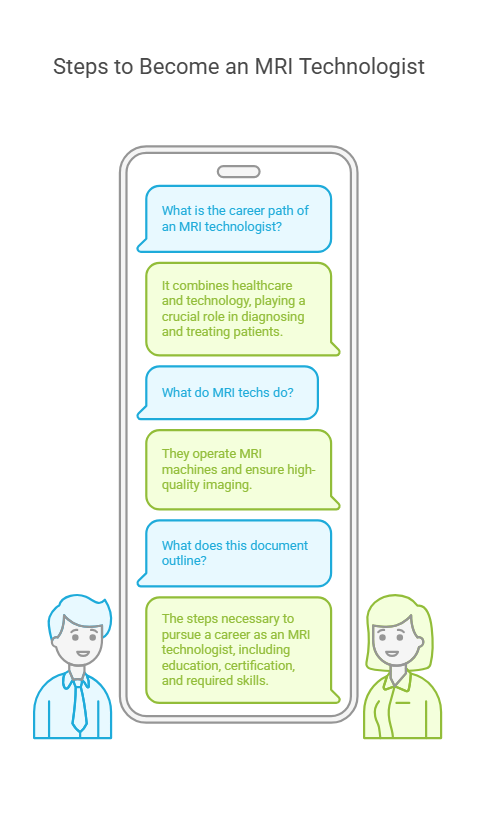how to become mri tech
how to become mri tech Magnetic Resonance Imaging (MRI) technologists play a vital role in modern healthcare, operating sophisticated MRI machines to produce detailed images that help diagnose and treat medical conditions. If you’re interested in a career that combines cutting-edge technology with patient care, becoming an MRI technologist could be the perfect fit. Here’s a comprehensive guide to help you get started.

1. Understand the Role of an MRI Technologist
MRI technologists are responsible for preparing patients, operating MRI equipment, and ensuring the safety and quality of imaging procedures. They work closely with radiologists and other healthcare professionals to provide critical diagnostic information. Key skills include attention to detail, strong communication, and a deep understanding of anatomy and imaging protocols.
2. Meet the Educational Requirements
To become an MRI technologist, you need formal education and training. Here’s what you need to do:
- Earn a High School Diploma or GED: Focus on science and math courses such as biology, physics, and algebra.
- Complete a Relevant Program: Enroll in an accredited radiologic technology program, which typically takes 2-4 years to complete. Many programs offer an associate degree, while some institutions provide certificate programs for individuals with prior healthcare experience.
- Specialize in MRI: Some programs allow you to specialize in MRI technology during your studies, while others may require additional certification afterward.
3. Gain Clinical Experience
Most educational programs include hands-on clinical training. This experience allows you to work with real patients, operate MRI machines, and develop essential skills under the supervision of experienced professionals.
4. Obtain Certification
Certification enhances your job prospects and demonstrates your competency as an MRI technologist. Steps include:
- Pass the ARRT Exam: The American Registry of Radiologic Technologists (ARRT) offers an MRI certification exam. Eligibility typically requires completing an accredited program and clinical training.
- Consider Additional Credentials: Some states require specific licensure or certifications, so check your state’s requirements.
5. Develop Key Skills
MRI technologists need a mix of technical and soft skills, including:
- Technical Proficiency: Understanding MRI machines, software, and safety protocols.
- Patient Care: Ensuring patients feel comfortable and informed during procedures.
- Problem-Solving: Quickly identifying and addressing imaging issues.
- Communication: Collaborating with healthcare teams and explaining procedures to patients.
6. Start Your Job Search
Once certified, you can begin applying for MRI technologist positions. Potential workplaces include hospitals, outpatient imaging centers, and specialized diagnostic facilities. Build a strong resume that highlights your education, certification, and clinical experience.
7. Advance Your Career
Consider opportunities for growth, such as:
- Continuing Education: Stay updated on the latest advancements in MRI technology and techniques.
- Specialization: Focus on areas like cardiac imaging or pediatric MRI.
- Leadership Roles: Transition into supervisory or managerial positions with experience and additional training.
FAQs About Becoming an MRI Technologist
1. How long does it take to become an MRI technologist?
It typically takes 2-4 years, depending on whether you pursue an associate degree, bachelor’s degree, or certificate program.
2. Do MRI technologists need a license?
Some states require licensure in addition to ARRT certification. Check the specific requirements for your state.
3. What is the average salary for an MRI technologist?
The average annual salary for MRI technologists in the United States is around $75,000, but this varies by location, experience, and workplace.
4. Is being an MRI technologist physically demanding?
The job can involve standing for long periods, assisting patients onto the MRI table, and handling heavy equipment. However, proper techniques can minimize physical strain.
5. Can I specialize in a particular type of MRI?
Yes, you can specialize in areas such as neuroimaging, musculoskeletal imaging, or cardiac MRI by pursuing additional training and certifications.
Conclusion
Becoming an MRI technologist is a rewarding career choice for those passionate about healthcare and technology. With the right education, certification, and dedication, you can join this growing field and make a meaningful impact on patients’ lives.
Meta Description: Learn how to become an MRI technologist, including education, certification, and career advancement tips. Discover a fulfilling healthcare career today.
